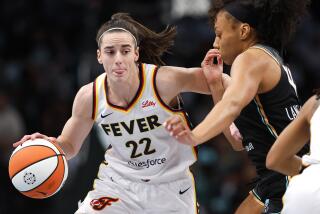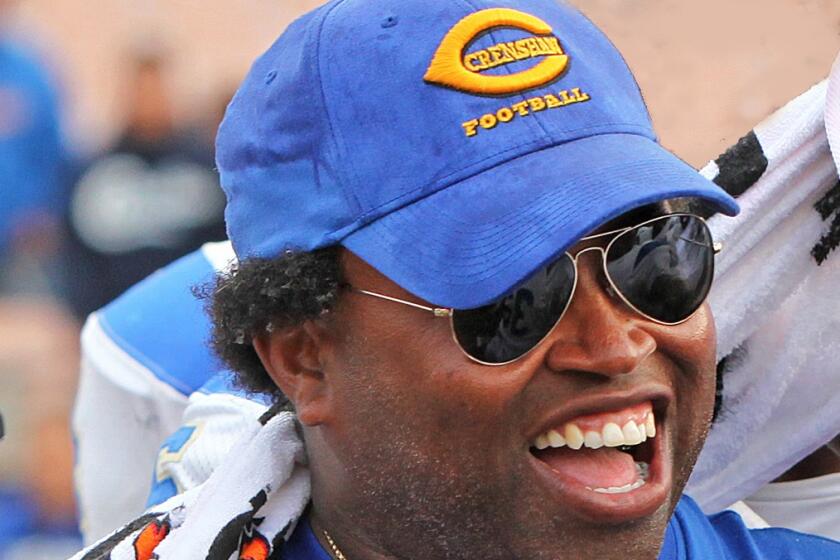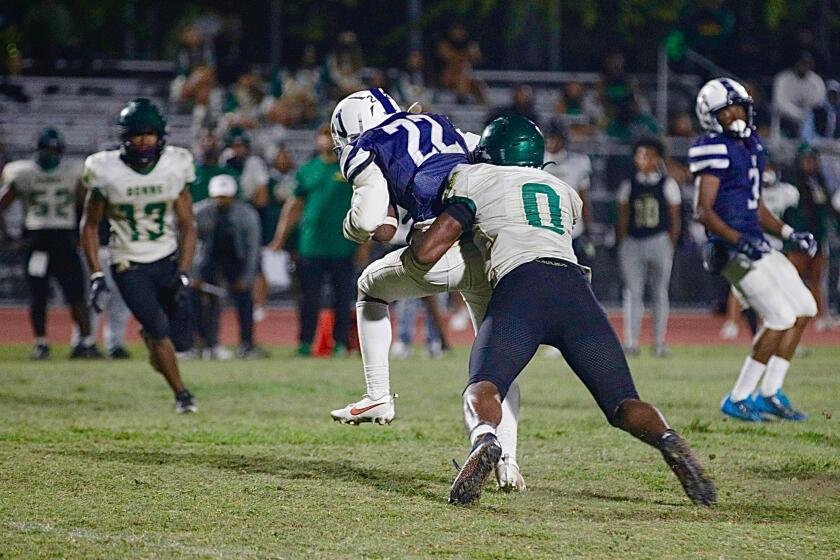To Announcers, It Still Is Baseball : Television: They say they will continue to put the game in the best possible light. Former players Rick Monday and Ken Brett have no qualms about broadcasting.
Vin Scully offered a disclaimer at the start of the first Dodger telecast this spring.
âWeâre not going to lie to you,â the veteran announcer said. âWhat youâre about to see is not major league baseball, but you are going to see professional baseball.â
Scully, a Dodger announcer since 1950, said he was compelled to make the statement out of respect for his audience. On the field were replacement players substituting for striking major league players.
âI had not talked to one person on the air since last August, so I thought it was a natural,â Scully said. âYou donât just come on and say, âHi, hereâs the starting lineup.â That would be a little rude, I would think, to say the least.â
But even if replacement players take the field when the regular season opens next week, Scully will not repeat the words.
Nor will Scullyâs Dodger broadcast partners, Ross Porter and Rick Monday, belabor the point that replacement baseball is not major league baseball. And Angel announcers Ken Wilson, Ken Brett, Bob Starr and Mario Impemba wonât apologize for whatâs happening on the field.
The announcers, employees of the teams, are paid to promote the product being offered, presenting it in the best possible light.
âWhen they cross the lines and throw the ball,â Porter said, âyou describe it as you would a World Series game.â
Said Scully: âIf youâre a car salesman, you sell the cars that are on the lot. You donât say, âWell, we used to have a better car.â â
At the same time, Scully added, âWeâre not trying to tell people that these players are anything but what they are. Weâre not trying to say that theyâre major leaguers. What we are saying is, itâs professional baseball and weâre delighted to have it because, otherwise, we wouldnât have anything at all.â
None of the announcers expressed any reservations about working replacement games.
âThis is my job,â said Starr, echoing his colleaguesâ comments. âItâs what I get paid for.â
Monday and Brett, former players who stand to reap pension benefits from the union, said they had no qualms about broadcasting games that have been belittled by the Major League Players Assn.
Neither has much sympathy for the unionâs hard-line approach toward replacement players, many of whom are minor league players. But neither expects to be ostracized by the regular players when the regulars return after the resolution of a dispute that has lingered since last August.
âThatâs absolutely the furthest thing from my mind,â said Brett, who, along with Wilson, has not yet worked a replacement game because KTLA-TV canceled the two Angel telecasts it had scheduled for the exhibition season. âIf I get backlash from them, thatâs a problem theyâre going to have. Itâs not a problem Iâll have. . . .
*
âThe union cares about the 800 people that are in uniform, and thatâs all they really (care) about. They donât care about me anymore. They donât care about the minor leaguers that are being put in a bind here.â
Monday, too, said that the striking players, who have threatened retaliation against the strike-breakers, have been too harsh in their attitude and comments toward the replacements.
âThe players that are in uniform right now are the innocent bystanders caught in the middle of somebody elseâs argument,â he said. âI thought it was unfair, frankly, to put the added pressure on these guys who, for the most part, had been invisible to the playersâ association for their entire careers and who, after a settlement is finally reached, will again become invisible.â
Making them visible in the meantime has presented a challenge to the announcers, who many times this spring have known little more about the players than fans have known.
âYou donât have the customary material to rely on,â Scully said. âWhen somebody comes up to the plate, you canât bring up, âGee, remember that base-hit he got against the Reds that knocked in two?â You donât have any of that. You just have to talk about the kid and try to introduce him to the fan. You have to do a little more digging.â
Starr, on Angel radio broadcasts this spring, has tried to interject as much information as possible about the playersâ backgrounds while describing the games.
âWhat we have done is itemize each playerâs career, to emphasize to the people listening that these are not guys who walked in off the street,â he said.
Also presenting a quandary to the announcers, of course, is the question of how much to say about the ongoing labor dispute between management and players.
âBaseball fans are smart,â Wilson said. âThey know what you have to sell and they accept that youâre offering it, presenting it in the best fashion.
âThereâs no reason to dwell on the strike. Everybody knows thereâs a strike, everybody knows the issues. So we really wouldnât be in much of a position to provide new information. I wouldnât hide it, but even if you didnât talk about it much, you wouldnât be hiding it because everybody knows whatâs happening.â
Scully, widely considered to be among the best announcers in baseball history, was criticized in 1981 when he and partners Porter and Jerry Doggett made no mention of a possible strike during the telecast of a game the night before the players walked out.
Instead, he hyped an upcoming home stand, even though it obviously would not be played.
âI felt I had nothing to add to the situation whatsoever,â Scully said. âI remember saying to the guys, âLetâs give the people a break. Letâs give them the game.â â
His attitude hasnât changed.
âI donât know what anyone would want me to say,â said Scully, alluding to baseballâs latest labor strife. âI have spent since last Aug. 12 having people ask me, âWhatâs going to happen?â And I give them the most honest and best answer I know of, and that is, âI donât know.â And that gets pretty old.
âFor me to come on the air and tell the millions of people that are listening--hopefully--that I donât know--thatâs not going to add much to the situation. And any baseball fan--in fact, even a non-baseball fan--has to be fed up to the gills with whatâs been going on since last August.
âSo, when opening day comes around, I want to celebrate the rebirth of baseball. The game is alive, itâs back. Letâs have some fun and enjoy it. I donât know what else to do, really.â
More to Read
Go beyond the scoreboard
Get the latest on L.A.'s teams in the daily Sports Report newsletter.
You may occasionally receive promotional content from the Los Angeles Times.










